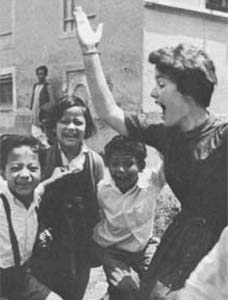
Adriana Publico, Luke Filose, Annika Dubrall serve in Mauritania
Cal alumni club flourishes in West African desert
By Luke W. Filose | 9 May 2005
Caption: Adriana Publico, Luke Filose, Annika Dubrall and companions in Mauritania
Peace Corps volunteer Luke Filose, who contributed this article, graduated from UC Berkeley in 1999 with a degree in political science. More Berkeley students have volunteered for the Peace Corps than from any other university.
MAURITANIA, AFRICA – The Islamic Republic of Mauritania is a country that even adventurous types consider the middle of nowhere. Nomadic herdsmen sip sweet mint tea under tents, camels stretch their necks to pluck thorns from scrubby trees, and pickup trucks bump and rattle past donkey carts. And incongruously, in the same 50-mile radius, three Cal grads work together.
It's not Timbuktu, but in some respects Mauritania is even more remote, and Annika Dubrall (2003, English/Political Science), Luke Filose (1999, Political Science) and Adriana Publico (2002, PEIS/French) were surprised to meet, each working for the Peace Corps, the United States' more than 40-year-old international volunteer program.
"We never met in Berkeley," says Filose, who lives in Kiffa, a medium-sized city 600 kilometers east of the capital Nouakchott. "But I discovered that Annika and I share common friends, and Adriana and I were born in the same hospital in Los Angeles."
Mauritania. (CIA's The World Factbook)
Mauritania is one of the largest countries on the African continent (think California and Texas combined), and with less than three million people it's also one of the least densely populated. About 100 of the Peace Corps' 7,500 current volunteers serve in Mauritania. It's an opportunity wrapped in a challenge: life in the country combines the flourishes of an ancient Islamic, semi-nomadic culture with the devastation of draught, locust plagues, and severe poverty.
In addition to fulfilling the Peace Corps' major goal of sharing cultures, these Cal grads focus on transferring skills. Dubrall and Publico teach high school English. Dubrall is a second year volunteer in Kankossa, a small, non-electrified lakeside town three hours south of Kiffa over a sand and dirt road. Publico and Filose are in their first years, and both live and work in Kiffa. Filose works with a local micro-finance bank while also teaching English. Publico also runs an after-school mentoring center for high school girls.
"Teaching is challenging here as the education system is completely different from what we're used to," says Dubrall, who teaches English to high school students during the week and to adults on weekends. Students have few textbooks, and volunteers craft lesson plans out of training materials and their imaginations.
Besides working, PCVs (Peace Corps volunteers) are encouraged to engage in "cultural exchange," which in Filose means socializing as much as possible.
"Most people here know little about America except what they hear on the radio or television," Filose explains. "People tend to think we're French, and often they assume we're doctors." By spending time with people and learning their languages (most speak a Berber dialect of Arabic), PCVs can step across cultural divides that, at first glance, appear to be chasms.
Mauritania is an especially challenging and important assignment, because while other Peace Corps countries are home to large communities of Muslims, Mauritania is the only Islamic republic with a Peace Corps program.
"It is a difficult adjustment," says Publico, who explains that female volunteers rarely shake hands with men, and they normally cover their heads and wear long skirts, even when temperatures soar to 120 degrees. But Mauritania is also known for its hospitality. "The Peace Corps helps us learn how to integrate as non-Muslims," adds Filose, "and while it's not always easy, we do feel welcome."
In addition to gaining new West African perspectives, these three Cal grads have met other Americans from all over the map. There's a volunteer from Fargo, North Dakota, one who grew up in Bali, "and there's even someone from Palo Alto whom we try to avoid," Filose teases. Despite the different American backgrounds, there's a common thread.
"Everyone joins the Peace Corps with their own goals," which says Filose can range from joining the front lines of the fight against HIV/AIDS to maybe just leaving one's hometown for the first time. "And once you arrive," he adds, "you are constantly re-evaluating those goals as you realize how different life is from anything you could have expected." But it is exactly those differences that most people seek in the Peace Corps, experiences that will open new doors and stay with the person forever.
The three Peace Corps volunteers lived very different lives while at Berkeley. Dubrall directed the Cal-in-the-Capitol program and gave campus tours. Filose edited the Heuristic Squelch, the student satire magazine. And Publico participated in the Rally Committee and Cercle Français. But they find ways to remember Berkeley when they are together.
Dubrall misses the open intellectual atmosphere, where people with different opinions can debate in public. Publico waxes nostalgic over the nightlife and fresh produce. Filose remembers the day "Alan Ross somehow got Danny Glover to guest lecture in my Political Science class," and his effort to open a new comedy venue that continues into the present.
Mauritania is a poor country and for Peace Corps volunteers, this means a dramatic adjustment. Dubrall lives in a one-room concrete house with no electricity, a pit latrine, and a water faucet at the edge of the property. Filose and Publico have some city benefits such as electricity and more imported products, but their houses lack running water.
The local diet is simple, with bread for breakfast, and lunch and dinner consisting of rice or couscous with a small serving of meat and occasional vegetables. With a few exceptions inside the capital city Nouakchott, Bay Area culinary delights such as gouda cheese, chocolate ice cream, and fresh bok-choy simply don't exist. "I thought I'd miss Zachary's Pizza the most," Filose said, but his standards have dropped considerably in almost a year. "I'm embarrassed to admit what I would pay right now for a day-old Taco Bell quesadilla."
Publico is using her free time to develop her flair for cooking. With air-mailed recipes and food section clippings, and an imagination that can use a toaster oven to transform millet flour into a birthday cake, Publico is using her appetite as a vehicle for cultural exchange. "My Mauritanian friends watch me prepare a meal and vice versa," she says. Recent menus include carne asada soft tacos with homemade tortillas, and pasta with cream sauce. Flexibility is often necessary, with canned sardines substituting for fresh swordfish and Kool-Aid filling in for wine. Publico has become something akin to Mauritania's Iron Chef. "If the market is flooded with beets," Filose remarks, "Adriana will find a way to make a first-class meal out of it."
Over 3,000 Berkeley graduates have served in the Peace Corps since the organization was founded in 1961. That's the most volunteers from any single university, but other schools are catching up. For instance, in 2003 Cal minted 83 volunteers, compared to 124 at the University of Wisconsin-Madison and 108 at the University of Texas at Austin.
In the opinion of these three Bears, the Peace Corps is not sufficiently recognized as a way to multiply your life options. But it has much to offer Americans of any age, such as new language skills and a place on the leading edge of globalization.
Then there are the more intangible and often surreal moments that make most PCVs happy they accepted the challenge. "Where else can you travel in the back of a pickup truck with 20 people and a goat?" Dubrall asks. "You can learn a foreign language that's not only difficult, but unusable back home," offers Publico. And Filose makes a final suggestion. "How do you know you wouldn't look good riding a camel?"
After their 27-month commitments are fulfilled, volunteers generally return to the States for work or graduate school, although some choose to extend their service or continue working abroad. This trio has not yet decided what paths they will pursue, but they do have plans to go see a Big Game together. "And win or lose," Filose adds, his memory of endless defeat from '95-'99 slowly fading, "we'll celebrate with wine and cheese."
Author Luke Filose invites readers to sign up for his "Adventures in Mauritania" newsletter which, he says, requires "only five convoluted steps!"
1. Go to www.coollist.com
2. Click "join a new mailing list" on the right side of the screen
3. Under "list ID" enter "lukepcrim"
4. Enter your e-mail address
5. Click "join"









